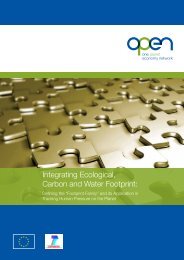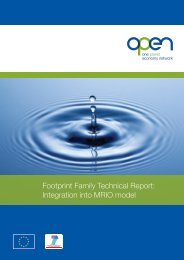OPEN: EU Scenario Storylines Report: - One Planet Economy Network
OPEN: EU Scenario Storylines Report: - One Planet Economy Network
OPEN: EU Scenario Storylines Report: - One Planet Economy Network
Create successful ePaper yourself
Turn your PDF publications into a flip-book with our unique Google optimized e-Paper software.
� Organic farming/permaculture measures to achieve nearly 100% organic<br />
or permaculture production in the <strong>EU</strong>. Organic farming assistance subsidies<br />
(independent of CAP payments) were introduced in 2012 with 400 <strong>EU</strong>R/ha and<br />
were then reduced to 300 <strong>EU</strong>R/ha in 2020 and 200 <strong>EU</strong>R/ha in 2030, 100 <strong>EU</strong>R/ha<br />
in 2040.<br />
Trade and geopolitics<br />
� International cooperation on carbon-intensive fuel taxation. As is the case<br />
on the taxation of raw materials, the successful international cooperation that is<br />
characteristic of this scenario enables a harmonised approach to the taxation of<br />
carbon-intensive fuels, with the tax rate gradually being ramped up to reduce the<br />
global consumption of these fuels (coal, oil and gas).<br />
� Agriculture. In this <strong>Scenario</strong>, certain import barriers (tariffs) for fair trade and<br />
organic agricultural products have been lowered compared to 2011. Foreign aid<br />
has been directed to producers supplying such products (e.g. through the <strong>EU</strong> SFA<br />
programme). However, an internationally-agreed ban has been imposed on<br />
commodities with unacceptably high impacts on footprint indicators (e.g. palm oil)<br />
and which are not certified to be sustainably sourced. With particular emphasis<br />
placed on social welfare, trade agreements have been amended to require strict<br />
compliance with worker rights codes (e.g. Ethical Trading Initiative (ETI)).<br />
� GMO Food Import Ban. Next to <strong>Scenario</strong> 1, measures to restrict GMO (food and<br />
organisms) products are most extreme in this scenario. An internationally-agreed<br />
ban on the trade of GMO products was phased in from 2014 to 2024, such that<br />
GMOs were no longer used or consumed in the <strong>EU</strong> by 2024 and led to a significant<br />
global reduction in the use of GMOs, which has enhanced biodiversity of crops and<br />
food security. A provision in the ban has allowed the import of GMO in extreme<br />
circumstances where food security is in jeopardy.<br />
� Trade policies which improve efficiency and result in reduced demand for<br />
the most harmful products and product sectors. Available technology was<br />
transferred to trading partners and shared as way of maximising efficiency gains,<br />
and reducing the impact of the most harmful product sectors (e.g. (1) chemical,<br />
rubber, and plastic products; (2) electronic equipment; and (3) machinery and<br />
equipment). Trade policies were coupled with education and media campaigns to<br />
reduce demand for harmful products, along with international pressure on<br />
countries producing these products to institute regulatory reform that resulted in<br />
reduced impact on the footprint indicators.<br />
Page 45 of 57





